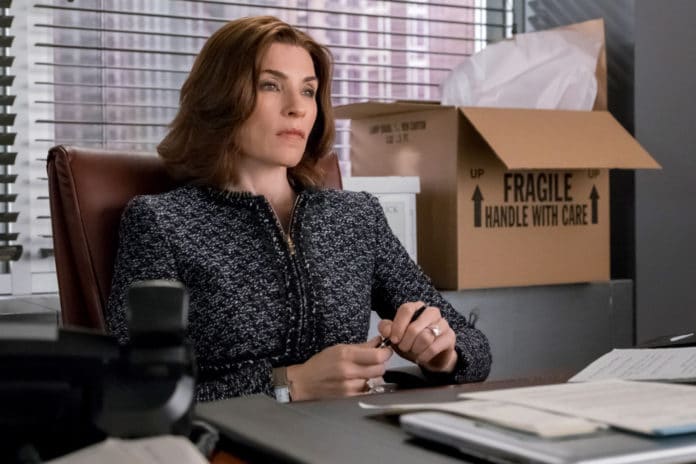Robert and Michelle King’s “The Good Wife,” which will end its superior seven-season run Sunday night on CBS, was a legal drama that split its journey along numerous thematic tracks, turning itself into many good shows at once, all of which were better than anything else on the broadcast networks.
Juggling court cases, political campaigns, Chicago corruption and corner-office showdowns, “The Good Wife” was also about marital ruin, female desire, frantic parenting and the millennial-boomer divide. On top of all that, it routinely delivered TV’s most timely and thoughtful takes on the fuzzy ethics of the digital age.
It’s not at all surprising, then, to find “The Good Wife” straining to complete its business before the final episode. The story arc was long and intricate. The main character’s key attribute was her ability to remain self-possessed and Sphinxlike when it came to revealing her deepest feelings. “The Good Wife” was packed with dialogue, and yet its real mastery was contained in its silent, contemplative stares.
In a way, “The Good Wife” has already given its fans the only conclusion that matters, in a brief scene that came last Sunday during the penultimate episode. It touched on everything viewers have ever loved about the show and its protagonist – including our inability to ever truly know her.
Lawyer Alicia Florrick (Julianna Margulies), who is still technically the first lady of Illinois while delaying her divorce from Gov. Peter Florrick (Chris Noth) until we find out whether he’s going back to prison, learns from a professional rival, Louis Canning (Michael J. Fox), that there is fresh evidence that her husband has been having an affair – another affair.
Canning treads lightly when breaking this news to Alicia, and for a sad nanosecond, it seemed as though “The Good Wife’s” rock had rolled all the way back down to the bottom of its hill.
When the show premiered, in 2009, it took as its basic inspiration from the stone-faced stares of all those real-life wives of pervy, philandering politicians, who found the resolve to publicly stand by their men, particularly at those embarrassing news conferences where the mea culpas are spun into damage control. What’s going through her mind? What will she say to him behind closed doors? How do you save a marriage like that? How do you move on? That’s where we met Alicia – broken, betrayed, bewildered and standing next to Peter at the lectern of disgrace.
This time, she’s clearly unmoved.
“Did you hear what I just said?” Canning asked her.
“Were you wanting me to cry, Mr. Canning?” Alicia said and then playfully obliged him, mimicking the flow of false tears and then sarcastically wiping them away, “Oh, my God, I thought my husband no longer cheated.”
With that mic-drop moment, the show was letting us know that no matter what happens, Alicia will always persevere – and perhaps even thrive.
So what if Peter goes to prison? So what if her son drops out of college and follows his fiancee to Paris? So what if Jason Crouse (Jeffrey Dean Morgan), the sexy-scruffy yet exceedingly one-note private investigator, is a poor substitute for Will Gardner or Finn Polmar? Who cares if Diane Lockhart (Christine Baranski) starts Chicago’s first all-female powerhouse law firm? Who cares if Alicia drinks all the wine? (And then all the tequila.) Who cares if those nerds at the NSA are listening in on her every muttered curse, on her hard-won sexual satisfaction? Who cares if she fibbed before a grand jury?
Her triumph is complete. She has left the orbit of other people’s problems. She is no longer taking Eli Gold’s phone calls. Is it somehow fittingly cold that “The Good Wife” has decided to leave us on Mother’s Day? Is it some subtle confirmation that Alicia is finished trying to clean up anyone’s messes except her own?
“Wow,” Canning said, with the real admiration that only a true nemesis can provide. “I love you.”
“I know,” Alicia said, and walked off.
Viewers and critics praised the show’s ability to balance its procedural leanings (the stories were always mired in at least one legal spat per episode) with its overall narrative. We loved the way it cycled dozens of memorable characters in and out as needed, perhaps even more smoothly than HBO’s “Game of Thrones” balances its sprawling roster.
“The Good Wife” was a departure from CBS’ usual house style (set in stone by the “CSI” and “NCIS” franchises) but somehow retained some essence of the network’s overall vision. It was scandalous, but not to the tabloid extremes of ABC’s “Scandal” and other ShondaLand offerings. It was topical without seeming “ripped from the headlines,” like NBC’s “Law & Order” dramas. It was feminine (feminist, actually), without spending all its energy on letting us know that.
And yet for all of Alicia’s personal and professional victories, there was one case “The Good Wife” just couldn’t win: It didn’t give rise to more network shows like it.
—
“The Good Wife” (one hour) series finale airs Sunday at 9 p.m. ET on CBS.






